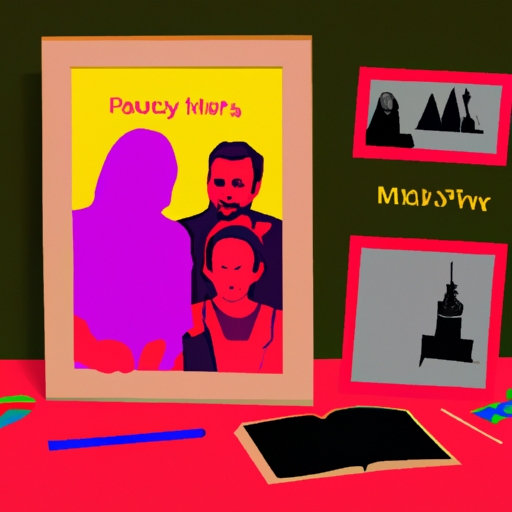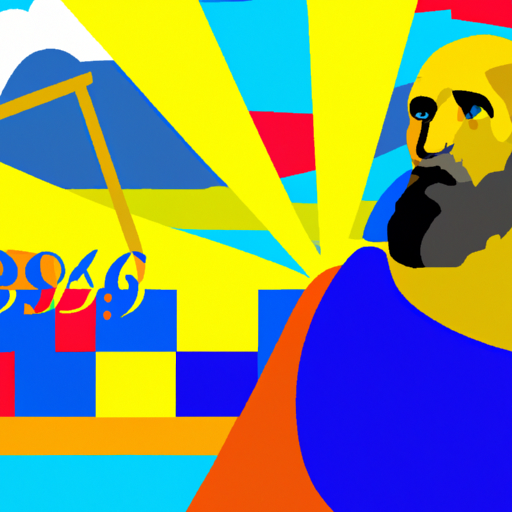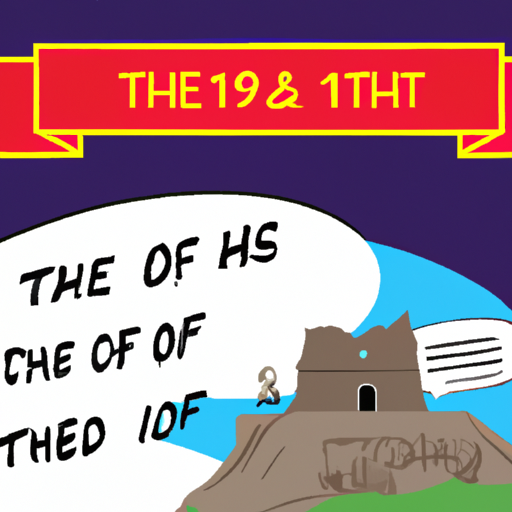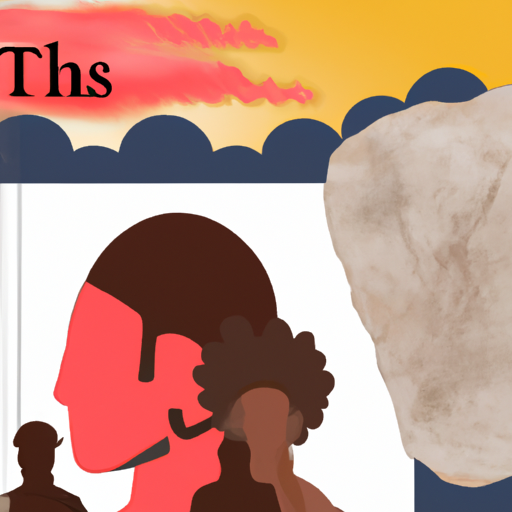Uncovering the History of the Garden of Eden: Does it Still Exist?
Unearth the past of the Garden of Eden, and ponder if it is still in existence! Delve into the mysterious depths of its story and discover what could be. Was it a mere legend? Or does this paradise still exist? Investigate for yourself and uncover the truth.

For centuries, a perplexing subject has been pondered: Was the Garden of Eden a legend or did it truly exist? Shrouded in mystery, clues may help us uncover the truth. From ancient texts to archaeological evidence, we can delve into the past and gain insight into this mythical paradise.
The Bible recounts that God created Eden as an ideal place. It was lush with vegetation and fruit trees, and four rivers coursed through it. Adam and Eve were placed there by God to govern over all living creatures. In Genesis 3:24, after disobeying Him by eating from the Tree of Knowledge of Good and Evil, they were expelled from Eden.
Archaeologists have sought evidence of the Garden of Eden since the 19th century yet none has been found thus far. Some believe Sumerian texts from around 2000 BCE describe an ancient garden called Dilmun which could be linked to Eden. These texts depict Dilmun as a serene paradise with plentiful water sources and food — similar to what is described in Genesis 2:8-14.
Though we may never know if the Garden of Eden still exists today, its history remains captivating nonetheless. By studying its past, we can gain a better understanding of our relationship with nature and our origins as human beings. We can also ponder how our actions today might shape our own version of paradise in the future!
.
Introduction

Speculation and conjecture have surrounded the Garden of Eden for centuries. An ancient paradise described in the Book of Genesis, it is thought to be the birthplace of humanity, sparking countless searches for its precise location. Though no clear answer has been determined as to whether or not it still exists today, various theories abound. Some suggest Mesopotamia, while others point to the Middle East or India. Additionally, there are those who believe the Garden of Eden could have been an allegorical representation instead of a real place. Whatever the truth may be, its legacy continues to spark curiosity and debate among scholars and theologians alike.
– Historical Accounts of the Garden of Eden
A story of wondrous proportions, the Garden of Eden has been depicted in a myriad of ways throughout the ages. A paradise where Adam and Eve lived before their expulsion due to disobedience, many interpretations have come from both ancient and more recent sources.
The earliest written account is found in the Book of Genesis, part of the Hebrew Bible. It tells us that God created Adam and Eve, placing them in a garden with every kind of tree for food, as well as instructions not to eat from the Tree of Knowledge; upon disobeying this commandment, they were cast out.
Sumerian Epic of Gilgamesh also contains a tale about Dilmun, which may be an earlier version of the Garden; Babylonian texts also describe Dilmun as a place where gods lived peacefully before humans were created.
More modern theories attempt to explain what happened in the Garden too; some scholars believe Adam and Eve to be two distinct tribes who were divided by religious differences or cultural clashes; others view it as an allegory for how humans can achieve perfection but must eventually face consequences when they sin.
No matter what interpretation you choose to believe, it is clear that the Garden of Eden has left its mark on human history for thousands of years. Its legacy continues to inspire us today and serves as a reminder that we should strive for perfection even if we know our actions will have consequences.
– Archaeological Evidence of the Garden of Eden
For centuries, the topic of archaeological evidence of the Garden of Eden has been a source of great curiosity. Little is known about the biblical paradise, and its exact whereabouts remain a mystery. Nonetheless, there are some archaeological findings that may offer clues as to its past.
The earliest indication of the Garden of Eden may come from Mesopotamia, now encompassing Iraq and Syria. The Sumerians, among the oldest known civilizations in the world, wrote about Dilmun or “the land where the sun rises” which could be related to this legendary site. Additionally, artifacts such as ancient temples have been discovered in this region that could point towards its existence.
Egyptian mythology also mentions Aaru or “the Field of Reeds” which could refer to the Garden of Eden. Furthermore, many Egyptian gods and goddesses were associated with plants and vegetation which could suggest an ancient garden paradise existed there.
Evidence from other cultures such as China and India also hint at a possible connection to this mythical place. Chinese mythology includes stories about Penglai Island which may allude to it while Hindu scriptures mention Vaikuntha, an eternal garden that could be correlated with it.
Altogether, these pieces of archaeological evidence provide insight into what may have been the original Garden of Eden described in religious texts. Though none can conclusively prove its existence or location, they raise interesting questions about this mysterious place.
– Ancient Legends Surrounding the Garden of Eden
For centuries, a tale of a legendary paradise has been passed down through the ages, with its roots in Jewish, Christian, and Islamic traditions. This mythical garden is often referred to as the Garden of Eden and is described in the biblical book of Genesis. It is said to have been created by God and inhabited by Adam and Eve before they were cast out due to their disobedience.
The Garden of Eden has been depicted in many forms throughout history, giving rise to varied interpretations and stories. Many believe that it was situated near the Tigris and Euphrates rivers in Mesopotamia (modern-day Iraq). This is supported by the fact that some plants mentioned in the Bible are native to this region. Although no archaeological evidence exists which could definitively prove whether or not this garden existed, its legacy continues to be felt around the world.
The Garden of Eden often serves as a metaphor for paradise or utopia; however, it can also represent innocence or naivety. It symbolizes a state before knowledge or understanding of good and evil was acquired, reminding us of our collective past and warning against prideful behavior.
Today, the Garden of Eden remains an integral part of religious history regardless if it was real or not. Its influence on society is undeniable, leaving behind a timeless message about human nature and our relationship with God for generations to come.
– Religious Perspectives on the Garden of Eden
Ascribed with a mysteriousness that has long captivated minds, the Garden of Eden is an enigmatic concept that has been the focus of much debate and speculation throughout the years. Believed by some to be a physical place in this world, while others view it as a spiritual realm existing outside of our physical universe or simply a metaphor for spiritual perfection or moral purity, its history is varied and complex.
In Christianity, the Garden is thought to have been created by God as a perfect home for Adam and Eve before their fall from grace. This viewpoint is supported by passages in Genesis which describe its lush vegetation and four rivers flowing out from it. Other biblical accounts suggest that the Garden existed for some time before Adam and Eve were created, hinting at it being part of God’s original plan for creation.
Judaism presents different opinions about the Garden’s origin story. Some believe it was an actual place located somewhere in this world, while others argue that it was a spiritual realm existing outside of our physical universe; still others interpret it as a metaphor rather than an actual place.
Islam also offers various interpretations on the Garden’s history. Some Muslims think it was an earthly paradise located somewhere in our world while others see it as a spiritual realm or even a metaphor for divine bliss or enlightenment.
No matter one’s religious beliefs, there is no denying the power and influence of the Garden of Eden throughout religious thought over centuries – inspiring countless works of art, literature and music – providing us with insight into human nature today.
– How Modern Society Views the Existence of the Garden of Eden
In this day and age, the Garden of Eden is often seen as a parable from antiquity. It’s generally assumed that it is a fable rather than an authentic location. Academics concur that the Garden of Eden was likely invented to explain why people must toil for sustenance and shelter, and why suffering exists in the world.
The Garden of Eden has been referred to in sacred literature throughout time, especially in the Bible. The biblical depiction portrays a nirvana where Adam and Eve were situated by God until they were cast out due to their disobedience. This narrative has been interpreted diversely by various religions and denominations, yet it continues to be an integral element of Christian mythology nowadays.
A lot of individuals believe that the Garden of Eden is emblematic of an ideal condition – one where humans lived peacefully with nature, without misery or pain. This concept has been scrutinized by scholars, theologians and scientists who have all made contributions towards current interpretations of the legend.
The Garden of Eden also serves as a reminder that life can be hard and unpredictable sometimes. Its very existence reminds us to strive for equilibrium between our own aspirations and needs, while taking into account how our behavior might affect others around us. In this manner, it stands as an imperative admonition for present-day society about how we should live our lives with sympathy and consideration for each other.
conclusion

Astonishingly, it would seem that the Garden of Eden, which has been referenced in many ancient accounts, is no longer in existence. Despite numerous conjectures regarding its whereabouts, none have been proven with absolute certainty.
.
Some questions with answers
Q1: Does the Garden of Eden still exist?
A1: No, the Garden of Eden is a mythical place from ancient history and is not believed to be an actual physical location.
Q2: What is the Garden of Eden?
A2: The Garden of Eden is a place described in the Bible as a paradise where Adam and Eve were created by God. It is often associated with perfection and peace.
Q3: Where was the Garden of Eden located?
A3: The exact location of the Garden of Eden is unknown, but it is believed to have been somewhere in Mesopotamia, which includes parts of modern-day Iraq, Syria, and Turkey.
Q4: When did the Garden of Eden exist?
A4: The Garden of Eden likely existed during ancient times, but there is no definitive answer as to when it existed since it was never discovered.
Q5: How has the Garden of Eden been portrayed in history?
A5: Throughout history, the Garden of Eden has been portrayed as a paradise on earth that was lost due to mankind’s disobedience to God. It has also been used as a metaphor for innocence and temptation.





